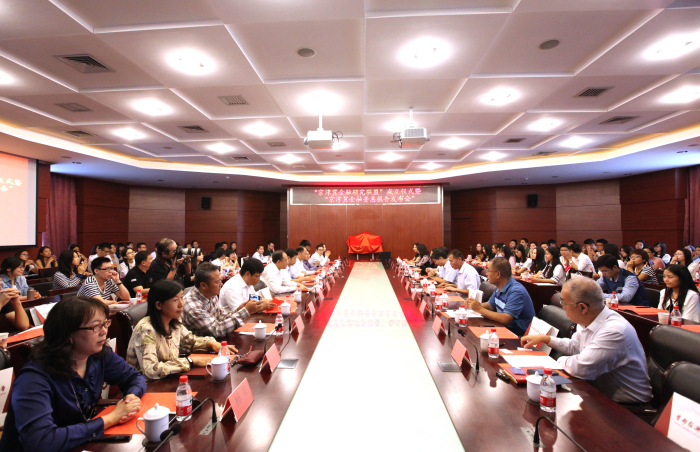"Beijing-Tianjin-Hebei Financial Research Consortium" Inaugural Ceremony

On September 18th, the "Beijing-Tianjin-Hebei Financial Research Consortium” Inaugural Ceremony and the "Beijing-Tianjin-Hebei Financial Inclusion Report Conference" were held at CUEB. It was sponsored by CUEB School of Finance, co-organized by Nordson Financial Group Institute, China Household Finance Survey and Research Center.
At the ceremony, Zhang Youlin, Deputy Director of the Beijing Municipal Bureau of Financial Work, Wang Chuansheng,CUEB Vice President unveiled the plaque for ‘Beijing-Tianjin-Hebei Financial Research Cosortium’. Wang delivered a welcome address. Wu Weixing, Dean of UIBE (University of International Business and Economics) School of Finance, Tan Xiaofen,
Associate Dean of CUFE (Central University of Finance and Economics) School of Finance, made their speeches. The inaugural ceremony was presided by Qi Yudong, CUEB Assistant Principal.
Professor Yin Zhichao, Deputy Director of CUEB School of Finance, on behalf of members of the Beijing-Tianjin-Hebei Financial Research Consortium issued the following initiatives. First, we should build open research platform and develop financial cooperative research: to carry out scientific collaborative research around the major theoretical and practical financial policy issues in the coordinated development of Beijing-Tianjin-Hebei; to construct top think-tanks and open research platform for financial research in order to provide intellectual support and enable informed decision-making for Beijing-Tianjin-Hebei economic transformation and upgrading. Second, we should focus on the coordinated financial development of Beijing-Tianjin-Hebei to serve the society: to conduct joint financial survey and research, root in reality, and concentrate on the coordinated development of Beijing-Tianjin-Hebei; to promote industry-college-research institute cooperation, strengthen model innovation of the research achievement transformation mechanism in universities, enhance the ability of schools serving the local economic and social development. Third, we should promote financial talents cooperation between schools and strength the exchange of teachers, students and teaching resources, gathering and training a number of top-notch innovative leaders; achieving teachers exchange between schools and sharing high-quality teachers; realize collaborative development and share high-quality curriculum resources; promoting cross-university exchanges and training of students, prompting the selection and cultivation of talents. Fourth, we should explore the construction of the regular exchange mechanism. Establishing a regular exchange mechanism means exchanging annually, seeking funding, and financial safeguarding mechanism; establishment of the Secretariat of the League, which is responsible for coordinating exchange activities.
At the same time, the School of Finance and Chinese Household Finance Survey Research Center released a report on the Beijing-Tianjin-Hebei financial inclusion. This report focused on the Beijing-Tianjin-Hebei financial inclusion overview, the effect of financial inclusion, family finance, and the influential factors of financial inclusion, impact of financial inclusion and other aspects, shedding new light on financial inclusion and the joint development of Beijing, Tianjin and Hebei. The report showed that imbalanced development of Beijing-Tianjin-Hebei financial inclusion and there were gaps in economic development between Beijing, Tianjin and Hebei.
Financial inclusion significantly narrowed the gap of Beijing-Tianjin-Hebei household wealth, household income, house consumption; it significantly reduced household poverty and household unemployment in Beijing, Tianjin and Hebei and fueled the development of family business in Beijing-Tianjin-Hebei.
At last, the report put forward three suggestions for Beijing-Tianjin-Hebei financial inclusion: Firstly, to provide financial knowledge to release the family financing needs. In Beijing, Tianjin, and Hebei, as financial knowledge rises, the rate of financial inclusion will rise by 26.5%.
Secondly, increasing financial services will promote the supply of financial services. In Beijing-Tianjin-Hebei region, if the number of financial institution nearby the community increases by 1%, the probability of financial inclusion will increases by 1% at the same time. Thirdly, promote the financial inclusion and encourage home businesses. We can encourage families to start up business by adding ATM terminals and financial networks, encouraging financial innovation to increase financial resource availability, lowering credit threshold, tilting business credit, strengthening entrepreneurship education and enlarging start-up investment.
